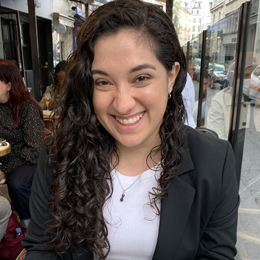Frédéric participated in the Olympic Torch Relay in Paris last July, and we couldn't wait to hear all about it!
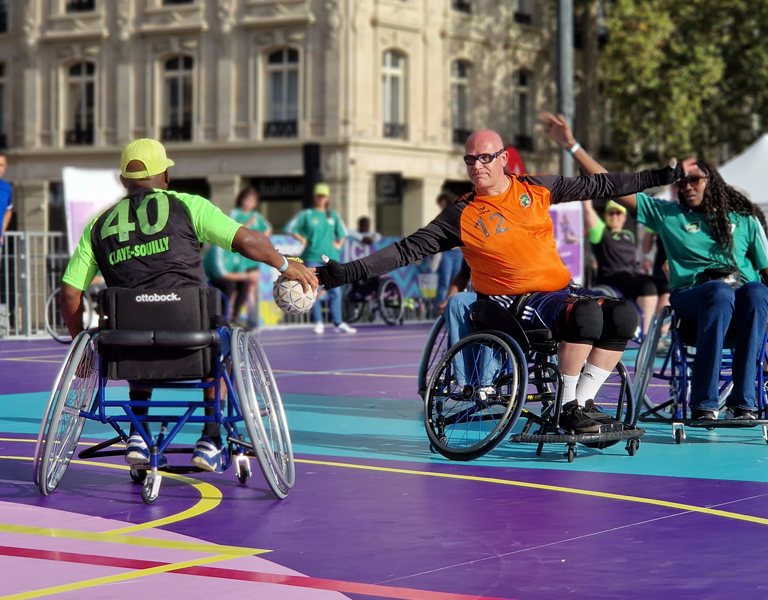 Frédéric Pasquier, playing wheelchair handball
Frédéric Pasquier, playing wheelchair handball
Interview :
Motion Composites: How did you come to be selected to carry the Olympic flame?
Frédéric Pasquier: I work for Orange, one of the world's leading telecom operators. My disability correspondent* suggested I submit my application, with no obligation on their part. I didn't have to do anything; they took care of everything. They asked me for some information; then, there was an internal validation process at Orange, the official supplier to Paris 2024, for all connectivity for the Olympic and Paralympic Games. Then, the applications were sent to the Olympic and Paralympic Committee, which makes the final decision after conducting its investigations.
It all seemed so surreal! I didn't think I'd be chosen to carry the flame because I imagined there were so many candidates and so few chosen. But then, my application was sent in September 2023, and I received my invitation in mid-January.
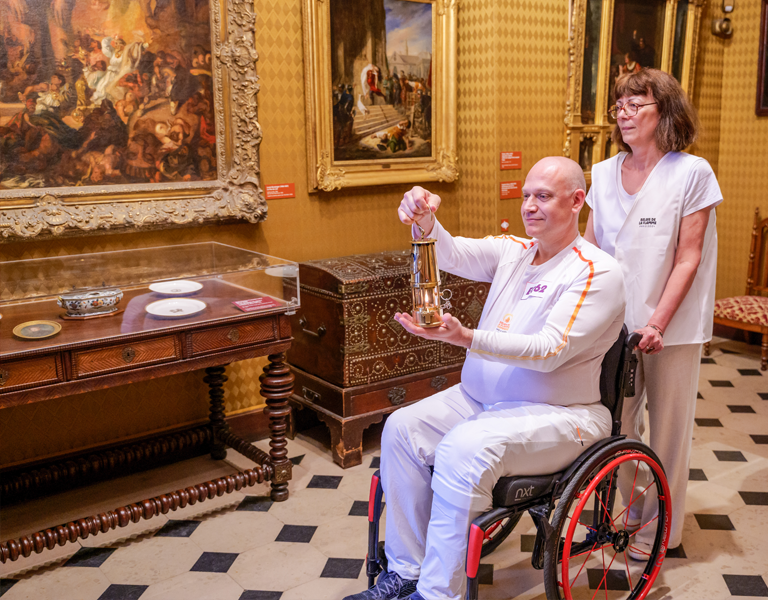 Frédéric Pasquier, during the Olympic Torch Relay in Paris 2024
Frédéric Pasquier, during the Olympic Torch Relay in Paris 2024
MC: What does it mean to you to be part of this important symbol of the Olympic Games?
FP: Ever since I was a child, I've watched the Olympic torch relay on television, as many people do. We often see showbiz personalities, politicians, and athletes. Even though I'm a member of the French para handball team, I never thought I'd become an Olympic torchbearer.
The flame conveys values such as peace and universality, a bit like the Olympic Truce, where even countries in conflict put aside their differences to make way for sport. For me, this reflects a human vision.
There are also more personal aspects. For example, when I took part in the relay at Victor Hugo's house, we read a text written by Victor Hugo in 1877, which is still relevant today. This text, which concluded with “Liberté, Égalité, Fraternité”** (Liberty, Equality, Fraternity), reflects an era in French history that, over 140 years later, is still relevant today. It was a truly magical moment!
MC: Can you describe your experience of the flame ceremony?
FP: The ceremony took place in a museum, so for safety reasons, it wasn't the torch but a lantern I was carrying. My biggest fear was dropping it, especially as the lantern was heavier than the torch. The torch – about a kilo and a half, while the lantern weighs around two kilos.
Before the ceremony, we had a short preparatory meeting with the other torchbearers. The man who passed me the lantern in the museum was the sports director of France Télévisions, responsible for the “live” Olympic flame in France. I saw him arrive from afar with the flame, which was then transferred to the lantern at the entrance to the museum. The stress began to increase at that moment because although it only lasted a short while, you were no longer in control. You're in front of the cameras, surrounded by photographers, police and other torchbearers.
There was a small challenge to overcome: crossing a doorway because I couldn't carry the lantern and push my wheelchair at the same time. So, my wife pushed my wheelchair. Once I had the lantern in hand, there was only one thing on my mind: not to drop it or let the flame go out. The kerosene tank feeds the flame and can go out if the lantern tilts too much. The keeper of the flame, off camera but close to me, gave me instructions on how to carry it properly, making sure that the Paris 2024 logo was facing the camera.
I took the lantern through the various rooms of Victor Hugo's apartment. In one of the rooms, an actress read a text by Victor Hugo. It was a moment out of time! It could have taken place in the 19th, 20th or, as it did, 21st century, except for my wheelchair, which was perhaps a little more modern than those of the 19th century (laughs).
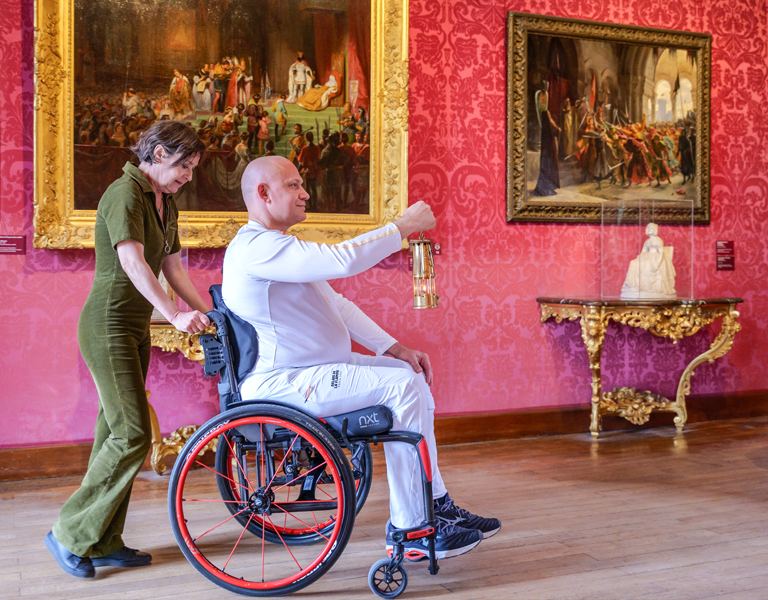 Frédéric Pasquier, during the Olympic Torch Relay in Paris 2024
Frédéric Pasquier, during the Olympic Torch Relay in Paris 2024
MC: How did it feel to hold the Olympic torch for the first time?
FP: It was magical, surreal and stressful all at the same time!
MC: What was the reaction of your family and friends when you told them you'd be carrying the flame?
FP: They were quite surprised, as it's not a common experience. I didn't know anyone who had carried the flame in previous Olympic games, so my family was very proud of me!
MC: How did you prepare for this moment?
FP: I scouted the location where the ceremony took place, which was Victor Hugo's home museum, and I talked to the museum staff. However, they had no precise idea of how the events would unfold. Apart from that, my preparation was mainly mental. Sports helped me a lot in my preparation, mainly through mental visualization. Then, I did a physical warm-up. I used a rubber band to warm up because holding a 2-kilo object at arm's length for five minutes takes stamina (laughs).
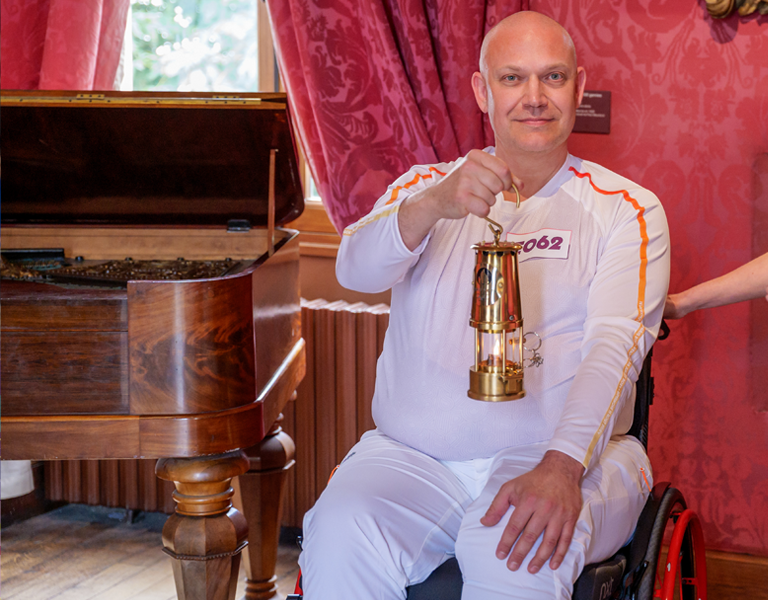 Frédéric Pasquier with the Olympic lantern
Frédéric Pasquier with the Olympic lantern
MC: What has this experience changed in your personal or professional life?
FP: My relay was not organized within the framework of the French Handball Federation, so I didn't experience it as a sporting event. On the other hand, on a professional level, I'm more in the spotlight now. Orange has an internal communications plan, given that they're the Games' technology partners, and you never know where that might lead.
MC: Speaking of your wheelchair, how did you first hear about Motion Composites?
FP: In June 2023, I went to a trade show dedicated to people with disabilities that crosses several cities in France. This show brought together companies, both retailers and manufacturers, who came to present their innovations, both electric and manual wheelchairs. I was looking for a lightweight, high-performance folding wheelchair for the city with a comfortable, adjustable backrest, and I didn't want a low backrest.
A sales representative recommended Motion Composites to me, and I visited the company's stand at the show. I met the French representative, Julien Desprez, as well as the Canadian team who was on site. I particularly liked the handrims, which you call Newton Air Grip. I really liked the concept. I then contacted the sales representative, who had let me test other chairs to see if she also distributed Motion Composites chairs. After sorting out all the paperwork, I received my VELOCE chair at the end of January, complete with NXT backrest and cushion and Newton Air Grip handrims.
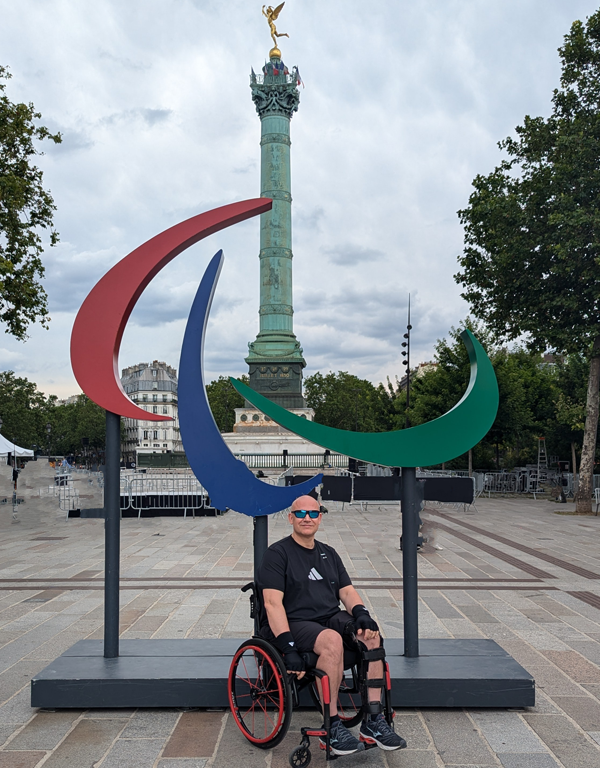
Frédéric Pasquier in his VELOCE Wheelchair
MC: What are your impressions of the VELOCE chair?
FP: It doesn't feel like a folding chair at all, and it's really lightweight!
MC: What are your impressions of the NXT backrest and NXT cushion?
FP: It's the summit of comfort!! In the office, I no longer transfer to an office chair as I used to. I remain seated in my wheelchair because, with my orthotic brace, the NXT BioFit cushion with SmartGel contours perfectly to the shape of the brace. If I were in a traditional office chair, I'd have to stretch out my leg on a footrest, which is not at all comfortable. But with my NXT cushion, I can spend all day in my chair without any problem. My back doesn't ache when I transfer to a chair or sofa.
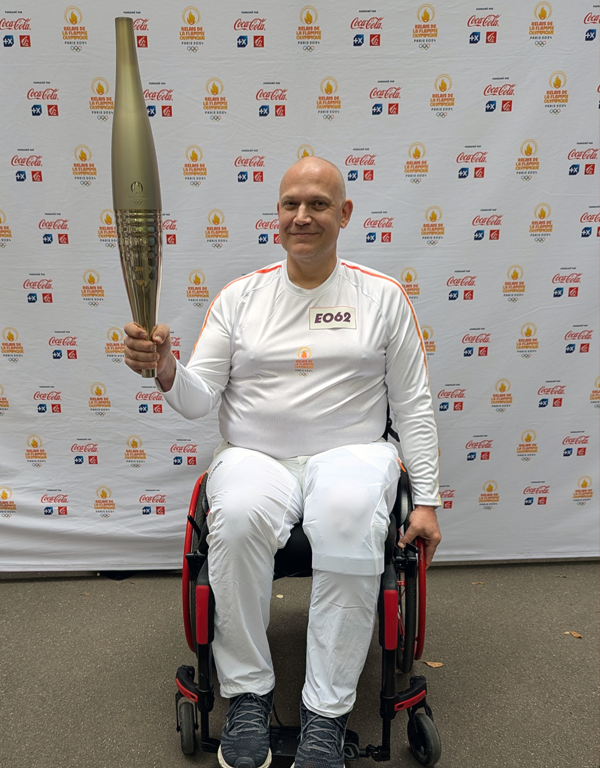
Frédéric Pasquier in his VELOCE Wheelchair
We want to thank Frédéric for taking the time to tell us about his Olympic Torch Relay experience. Don't forget to follow Frédéric on his social networks (LinkedIn, Instagram) to keep up with his new adventures in his VELOCE.
As for us, we hope that his wheelchair handball sport will soon become an official Paralympic sport and that we'll be able to see him and his teammates in the Paralympic Games that will take place in Los Angeles in 2028!
* In France, the role of the disability correspondent is to guide, inform and support people with disabilities in the workplace. They are also responsible for developing the company's disability policy in conjunction with other departments.
** French national motto that dates from the French Revolution. These values are still reflected today in French society.







 Frédéric Pasquier, playing wheelchair handball
Frédéric Pasquier, playing wheelchair handball Frédéric Pasquier, during the Olympic Torch Relay in Paris 2024
Frédéric Pasquier, during the Olympic Torch Relay in Paris 2024 Frédéric Pasquier, during the Olympic Torch Relay in Paris 2024
Frédéric Pasquier, during the Olympic Torch Relay in Paris 2024 Frédéric Pasquier with the Olympic lantern
Frédéric Pasquier with the Olympic lantern

